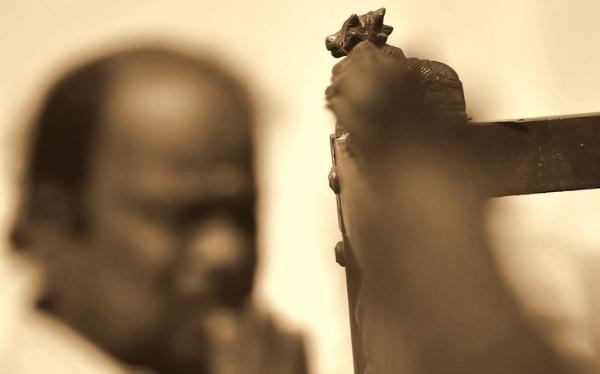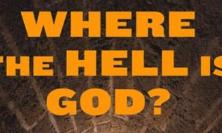In a new book due to be launched tomorrow in London, Australian Jesuit, Richard Leonard looks at how we understand the presence of God in our lives when we are faced with suffering. Using his own experience of a family tragedy, Fr Richard speaks about his personal response when he is tempted to ask: ‘Where the hell is God?’
Most explorations of where or how God can be found in human suffering tend to be fairly academic. I have found them to be immensely important, even when I have disagreed with their arguments or conclusions. I have even found the intellectual distance they establish to be somehow helpful in dissecting an anything but distant enquiry.
My passion for some answers in this area started from a different base. It was not, primarily, an academic question, though I hope my thoughts are intelligent. My interest started from experience, from my grappling with a family tragedy which forced me to confront how I can hold on to my belief in a loving God in the face of suffering.
On 23 October 1988 my sister, Tracey, was involved in a freakish car accident: she dislocated the 5th cervical vertebra and fractured the 6th and 7th vertebrae. For the last 23 years she has been a quadriplegic. Tracey is one of the finest people I know, and even at the time of the accident, at 28 years of age, she had already lived in Calcutta for three years and nursed the poorest of the poor at Mother Teresa’s House of the Dying. She had returned to Australia and got a job working with the Sisters of Our Lady of Sacred Heart, running a health centre for Aboriginal people at Port Keats. It was near there that the car accident happened.
Within twelve hours of my mother finding out about Tracey’s accident, she was standing in a hospital room in Darwin asking, ‘Where the hell is God?’
In the months that followed I received some of the most appalling and frightening letters from some of the best Christians I knew. A few wrote, ‘Tracey must have done something to deeply offend God so she had to be punished here on earth.’ They actually believe that God is out to get us. I have discovered since 1988 that this theology is far more common than I would have ever imagined. I have met people with cancer, couples with fertility problems and parents who have lost a child – all of whom have asked me what they ever did to deserve the curse under which they think God has placed them.
Others wrote, ‘Tracey’s suffering is sending up glorious building blocks to heaven for her mansion there when she dies.’ This is what is usually called ‘pie in the sky when you die theology’. I did not know that in heaven, in the many rooms of the Father’s house, there are first, business and economy class suites. There were scores of letters and cards which said, ‘Your family is really very blessed, because God only sends the biggest crosses to those who can bear them.’ I always found it strange that some people, who are not receiving that particular blessing, can see it so clearly in other people’s suffering. But let us think about this line a little more. We hear it often. If it is true, then we should all be on our knees morning, noon and night with only one prayer: ‘I am a wimp. I am a wimp. I am a wimp, O God. Do not consider me strong.’
Added to these responses were those of good people who were trying to be comforting, and so gave out the usual trio of replies in the face of bad news: ‘It’s all a mystery’; invoking Isaiah 55 with, ‘My ways are not your ways’; and ‘Only in heaven will find out God’s plan.’ There is a truth in each of these statements, but I thought that one of the points of the Incarnation is precisely that God wants to reveal his ways and thoughts, wants to be known, especially in the moments when we are sometimes given to the greatest despair. We do not believe and love an aloof being who revels in mystery and goes AWOL when the action turns tough in our lives. The Incarnation surely shows us that God is committed to being a participant in the human adventure in all its complexity and pain.
23 years later I am very grateful to the correspondents who wrote to me after my sister’s accident. They have alerted me to how often we hear some terrible theology, which does not draw people to God, in the worst moments of our lives. It alienates us. It alienated me for a while from believing in a God who wants us to have an intelligent discussion about the complexities of where and how the Divine presence fits into our fragile and human world. So here are my steps to spiritual sanity when we are tempted, and we give into the temptation, to ask, ‘Where the hell is God?’
In offering anything on this topic we are squarely in the domain of speculative theology. Greater minds than mine over the centuries have applied themselves to these questions and have come to different conclusions about them. I am happy for that. The problem is that when I most needed their insights, I found their answers inadequate. I am not blaming them. The vast majority of them did not have the benefit of contemporary biblical studies, theology, science, and psychology to lend a hand.
The Church knows, too, that it cannot be definitive about these matters, because on this side of the grave we just do not know where or how God fits with regard to the suffering of the world. Therefore I make no greater claim for my ideas than that they have helped me hold on to faith in a loving God as I walked through the ‘valley of tears’ and in the ‘shadow of death’.
God does not directly send pain, suffering and disease. God does not punish us, at least not in this life. I hold this confidently because in 1John 1:5 we are told that, ‘God is light, in him there is no darkness’ – so deadly and destructive things cannot be in the nature of and actions of God. Secondly, whatever we make of the varied images of God in the Old Testament, in Jesus God is revealed as being about life not death, construction not destruction, forgiveness not retribution, healing not pain. There is a huge difference between God permitting evil and God perpetrating such acts on us. We need to stare down those who promote and support a theology that portrays God as a tyrant.
God does not send accidents to teach us things, though we can learn from them. We do not need to blame God directly for causing our suffering in order for us to turn it around and harness it for good. The human search for meaning is a powerful instinct but I think spiritual sanity rests in seeing that in every moment of every day, God does what he did on Good Friday: not allowing evil, death and destruction to have the last word, but ennobling humanity with an extraordinary resilience and, through the power of amazing grace, enabling us to make the most of even the worst situations and let light and life have the last word. Easter Sunday is God’s response to Good Friday: life out of death.
God does not will earthquakes, floods, droughts or other natural disasters: can we stop praying for rain please? If God is directly in charge of the climate, he seems to be a very poor meteorologist indeed. When people ask, ‘why did the earthquake and tsunami happen?’, I think it best if we just tell them the simple geophysical truth: ‘Because the earth shelf moved, setting off a big wave.’ Behind the meteorologist-in-the-sky idea is not the God and Father of Jesus Christ, but Zeus, and I think we have to be careful what we think petitionary prayer does. It cannot change our unchanging God (James 1), so it asks our unchanging God to change us to change the world.
God’s will is more in the big picture than in the small. I believe passionately in the will of God. It is just that I believe it is discovered on the larger canvass rather than in the details. I think God wants me to live out the theological virtues of faith, hope and love (1 Corinthians 13). Through the blessing of time and place, the gifts of nature and grace, I work with God to realise my potential in the greatest way possible, even if that involves having to do things that are difficult, demanding and sacrificial. This response is not out of fear and compulsion, but comes from love and desire. I think we should be very careful in talking about God’s will using lines like, ‘But for the grace of God, go I’. What about the poor person who was not so blessed? Did God not care about them?
God did not need the blood of Jesus. Jesus did not just come ‘to die’ but God used his death to announce the end to death. This is the domain of ‘offer it up’ theology: it was good enough for Jesus to suffer; it is good enough for you. While I am aware of St Paul in Romans, St Clement of Alexandria, St Anselm of Canterbury and later John Calvin’s work on atonement theory and satisfaction theology, I cannot baldly accept that the perfect God of love set up for a fall in the Fall, then got so angry with us that only the grisly death of his perfect son was going to repair the breach between us. This is not the only way into the mystery of Holy Week. For most of Christian history the question that has vexed many believers seems to be, ‘Why did Jesus die?’ I think it is the wrong question. The right one is ‘Why was Jesus killed?’ And that puts the last days of Jesus’ suffering and death in an entirely new perspective. Jesus did not simply and only come to die. Rather, Jesus came to live. As a result of the courageous and radical way he lived his life, and the saving love he embodied for all humanity, he threatened the political, social and religious authorities of his day so much that they executed him. But God had the last word on Good Friday: Easter Sunday.
God has created a world which is less than perfect, else it would be heaven, and in which suffering, disease and pain are realities. Some of these we now create for ourselves and blame God. I have lost count of the number of people who have said to me, ‘I cannot believe in a God who allows famines to happen.’ I think God wonders why we let famine happen. God is responsible for allowing a world to evolve within which the effects of moral and physical evil can create injustices. But God is not responsible because we refuse to make the hard choices that would see our world transformed into a more just and equal place for everyone. In the face of this obstinacy, it is not surprising that we find a divine scapegoat to carry the guilt for our lack of political will and social solidarity.
God does not kill us off. As Catholics, thank God, at least since the 1960s, we do not officially take the scriptures literally until we go near texts about God knowing the ‘hairs on our head’ and the ‘span of our days’ (Jer 1:5; Gal 1:15-16; Prov 16:33; and Matt 10:30). Then we become completely fundamentalist. When I go near a nursing home I am regularly asked, ‘Father, why won’t God take Grandma? To which I reply ‘Because Grandma won’t stop breathing yet.’ I do not actually say this. I have more pastoral sense than that, but I want to. The verb ‘take’ is so revealing of what we think is going on here. Why would God’s desire ‘to take’ a two year old to heaven be more than God’s desire ‘to leave’ this child in the arms of loving parents? In contrast to this, I think it is entirely appropriate to believe that life, from the womb to the nursing home, is not allotted a span, as such, by God, but that our body will live until it can no longer function, for whatever natural or accidental reason. God is not an active player in this process, but, again, has to take responsibility for making us mortal. Then, when our body dies, our soul or spirit begins its final journey home.
Some might think that the theology outlined here presents God as remote or aloof. I do not need to think that God has to be the direct cause of everything in my life to have a strong and lively belief in a personal God. Indeed, I am passionate about God’s personal love and presence. Thinking that God is removed from the intricate detail of how things develop does not remove God from the drama of our living, our suffering and dying. God waits patiently for an invitation to enter our lives at whatever level we want. Christ meets us where we are, embraces us and holds us close when the going gets tough, and helps us find the way forward, even and most especially, on that last day when we find the way home.
Rev Dr Richard Leonard is a Jesuit of the Australian Province and author of Where the hell is God? (Paulist Press, 2010). He will be giving a public lecture on the book at its UK launch at 6pm on Tuesday 22 March 2011 at St Paul’s Bookstore, Morpeth Terrace, London SW1.
![]() Thinking Faith reviews Where the Hell is God? by Richard Leonard SJ
Thinking Faith reviews Where the Hell is God? by Richard Leonard SJ
![]() More information about Where the hell is God?
More information about Where the hell is God?





